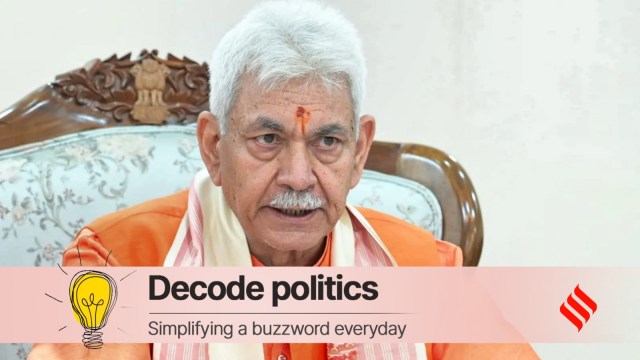MAINSTREAM political parties in Kashmir have reacted sharply to changes notified by the Union Ministry of Home Affairs on Friday that enhance the powers of the Lt Governor on government departments and over the appointments and transfer of senior civil and police officers.

What are the changes notified by the Centre?
The Transaction of Business of Government of UT of Jammu and Kashmir (Second Amendment) Rules, 2024, deals with the powers of the LG related to police, public order, All India Services and transfers and postings.
Story continues below this ad
As per the notification by the Union Home Ministry, the transfer or posting of any officer from the All India Services – which means the entire top rung of the administration, including all the administrative secretaries, heads of departments and deputy commissioners – has to be approved by the LG.
The government must also seek approval of the LG to appoint “the Advocate-General and other Law Officers to assist the Advocate-General in the court proceedings”. Besides, the LG will have the last word on any proposal for grant of prosecution sanction.
The amendments say all such proposals should be forwarded to the LG, through the Chief Secretary, for the final call.
The amendments also state: “No proposal which requires previous concurrence of the Finance Department with regard to Police, Public Order, All India Service and Anti Corruption Bureau to exercise the discretion of the Lieutenant Governor under the Act shall be concurred or rejected unless it has been placed before the Lieutenant Governor through the Chief Secretary.”
Story continues below this ad
As per a political leader, “Earlier, the Governor used to be the ‘advisor’ of the chief minister; now the chief minister and the Cabinet will be advisors to the ‘Governor’.”
Why are the changes significant?
The Supreme Court had asked the Centre to conduct the Assembly elections in J&K by September. The changes before that as notified on Friday are being seen by the Valley as an indication that the Centre wants to bring key powers under its own domain before an elected government. The mainstream politicians of Kashmir criticised the amendments as being against democratic values and principles.
Former chief minister and National Centre leader Omar Abdullah said “a firm commitment laying out the timeline for restoration of full, undiluted statehood for J&K” is a prerequisite for Assembly elections. “The people of J&K deserve better than powerless, rubber stamp CM who will have to beg the LG to get his/her peon appointed,” Omar posted on X.
Senior PDP leader and its youth president Waheed Parra told The Indian Express that the Assembly elections when they are held would be “meaningless” after these changes, and said they were a continuation of what began on August 5, 2019. “Whether they now hold the elections or not, the L-G has the powers of the Assembly, the Cabinet and the government,” Parra said.
Story continues below this ad
Calling the amendments a “huge structural disempowerment”, the PDP leader said that an elected government would only be a “glorified municipality” now. “It would be a Legislative Assembly without the powers of legislation.”
What is the justification for the changes?
As per official sources, the notification by the Union Home Ministry was not about amendments to the Jammu and Kashmir Reorganisation Act, 2019, but changes to the Transaction of Business Rules to “avoid any ambiguity”. “This notification does not in any sense alter the balance of powers as enshrined in the Jammu and Kashmir Reorganization Act, 2019,” a source said, emphasising that the Act had been “passed by Parliament and upheld by the Supreme Court”.
Sources said that the notification would provide “better clarity on processes so as to enable smooth administration”. “As per Section 32 of the Act, the Legislative Assembly may make laws with respect to any of the matters enumerated in the State List except police and public order, or the Concurrent List in the Seventh Schedule to the Constitution of India. As per Section 53 of the Act, the Lieutenant Governor shall exercise his functions in his discretion in a matter which falls outside the purview of powers conferred on Legislative Assembly, related to All India Services and Anti-Corruption Bureau and any other matter which he is required by or under any law to act in its discretion,” a source said, adding that this is what the changes laid out.
“The powers of the Legislative Assembly and functions of the L-G have been clearly defined and delineated in the Act, and the same have now been reflected in the Transaction of Business Rules.”
Story continues below this ad
What indications have come from the government regarding elections in J&K?
During his address in Srinagar on the occasion of the International Day of Yoga last month, Prime Minister Narendra Modi said Assembly elections in J&K would be held “soon” and its statehood restored.
Earlier, Union Home Minister Amit Shah said in an interview that the polls would be conducted before the September 30 deadline of the Supreme Court.
The Election Commission has ordered the summary revision of electoral rolls in J&K to be completed and published by August 20.
— With ENS, Delhi

































